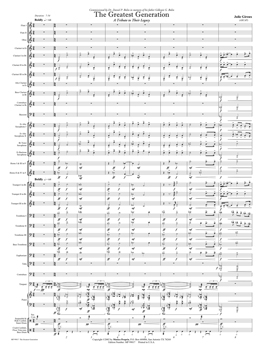Instrumentation
4 - Flute 1
4 - Flute 2
2 - Oboe
1 - E♭ Clarinet
4 - B♭ Clarinet 1
4 - B♭ Clarinet 2
4 - B♭ Clarinet 3
2 - E♭ Alto Clarinet
2 - B♭ Bass Clarinet
1 - E♭ Contrabass Clarinet
1 - B♭ Contrabass Clarinet
2 - Bassoon
1 - Contrabassoon
2 - E♭ Alto Saxophone 1
2 - E♭ Alto Saxophone 2
2 - B♭ Tenor Saxophone
1 - E♭ Baritone Saxophone
2 - F Horn 1 & 3
2 - F Horn 2 & 4
3 - B♭ Trumpet 1
3 - B♭ Trumpet 2
3 - B♭ Trumpet 3
2 - Trombone 1
2 - Trombone 2
2 - Trombone 3
2 - Bass Trombone
2 - Euphonium B. C.
2 - Euphonium T. C.
4 - Tuba
1 - Contrabass
1 - Timpani
1 - Piano
1 - Bells
2 - Suspended & Ride
Cymbals, Snare Drum
2 - Crash Cymbals, Tom-tom,
Bass Drum
The Greatest Generation (7:54)
A Tribute to Their Legacy
Grade 4+
by Julie Giroux
Premiered 2002 by The United States Navy Band
Captain Ralph M. Gambone, Conductor
Indianapolis, Indiana
Program Notes
(by Dr. Daniel P. Bolin, who commissioned this work
in memory of his father Gillespie G. Bolin)
In December 2000, my father, Gillespie Bolin, passed away suddenly. He was born in 1921 and was part of what is now known as the greatest generation. Following his funeral I traveled to Chicago for the annual Midwest Clinic. There I knew I would find comfort among friends and colleagues. It was also there that I first spoke with Emmy Award-winning composer Julie Giroux about the idea of writing a composition for band in memory of dad and all of those members of his generation who are responsible for the America we know and love.
Dad grew up during the Great Depression and served in the Navy during World War II. While in the Navy he was stationed in New York City where he would entertain our troops on weekends at the Navy Pier. Following the war he returned to Indianapolis where he and my mother, Genell, raised my brother Steve (now a rocket scientist for NASA at the Jet Propulsion Labs in Pasadena, CA) and me (professor of music and former chairman of the music department at Butler University in Indianapolis).
My early interest in music was inspired by listening to dad play on our old Story and Clark piano in the music room of our house each day when he came home from work. I vividly remember his piano and organ playing at our church and watching him in local talent shows on television, which were a part of the regular fare during the infancy of that media.
In discussing the composition with Julie, I asked her to write a work that would reflect the time period in which dad lived. Her work begins with a dramatic fanfare that includes fragments of some melodies relevant to the period. Following the introduction there is a theme that is introduced that ties the work together. We hear a Gershwinesque rhythm that seems to symbolize the growth of our nation following the depression. The work pays homage to those who did not return from WWII with a slow expressive section, which features the piano (most fitting for dad). It concludes with a vibrant finale that once again features lively jazz rhythms and seems to indicate the work and prosperity that this generation gave to our nation. D.P.B.


Home | Composers | Grade Levels | Order Form | Contact
©2010 Musica Propria, Inc.

